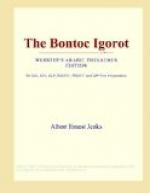There is much exchange of labor between individuals, and even between large groups of people, such as members of an ato. Formerly exchange of labor was practiced slightly more than at present, but to-day, as has been noted, all dwellings are built by the unpaid labor of those who come for the accompanying feast and “good time,” and because their own dwellings were or will be built by such labor. A great deal of agricultural labor is now paid for in kind; practically all the available labor in an ato turns out to help a member when a piece of work is urgent. However, it is not customary for poor people to exchange their labor, since they constantly need food for those dependent on them. When the poor man desires a wage for his toil he needs only to tell some rich person that he wishes to work for him — both understand that a wage will be paid.
Distribution
By the term “distribution” is here meant the ordinary division of the productions of Bontoc area among the several classes of Igorot in the area — in other words, what is each person’s share of that which the area produces?
It must be said that distribution is very equitable. Wages are uniform. No man or set of men habitually spoils another’s accumulations by exacting from him a tax or “rake off.” There is no form of gambling or winning another’s earnings. There are no slaves or others who labor without wages; children do not retain their own wages until they marry, but they inherit all their parents’ possessions. There is almost no usury. There is no indigent class, and the rich men toil as industriously in the fields as do the poor — though I must say I never knew a rich man to go as cargador on the trail.
Theft
Higher forms of society, even such society as the Christianized Filipinos of the coastal cities, produce and possess a considerable number of people who live and often raise families on personal property stolen and carried away from the lawful owners. Almost no thief in the Bontoc area escapes detection — the society is too simple for him to escape — and when he is apprehended he restores more than he took away. There is no opportunity for a thief class to develop, consequently there is no chance for theft to distort the usual equitable division of products.
Conquest
Conquest, or the act of gaining control and acquisition of another’s property by force of arms, is not operative in the Bontoc area. Moro and perhaps other southern Malayan people frequently capture people by conquest whom they enslave, and they also bring back much valuable loot in the shape of metals and the much-prized large earthen jars.




